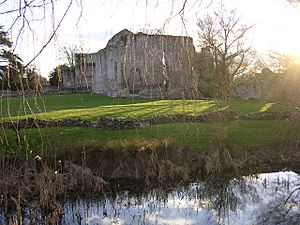Richard Whitehead (Hampshire MP) facts for kids
Richard Whitehead (born 1594 – died around 1663) was an English politician. He was a member of the English Parliament many times between 1628 and 1653. He also fought for the Parliament's army during the English Civil War.
Contents
Richard Whitehead: A Life in Parliament and War
Early Life and Education
Richard Whitehead was born on January 15, 1594. He was the oldest son of Sir Henry Whitehead. His family lived at Norman Court in Hampshire. Richard went to Brasenose College, Oxford in 1610. He earned his first degree in 1612. After that, he studied law at the Inner Temple in 1613. He also traveled abroad between 1614 and 1617.
Becoming a Member of Parliament
In 1628, Richard Whitehead was chosen to be a Member of Parliament for Lymington. He served until 1629. At that time, King Charles I decided to rule without Parliament for eleven years.
When his father died in 1629, Richard inherited the family lands. These were in Shirley and Hill. In 1635, he became the High Sheriff of Hampshire. His job was to collect a special tax called ship money for the county. He found it hard to collect this money. He even wrote to the council to complain about how slow people were to pay. He was ordered to collect all the unpaid money.
Fighting in the English Civil War
In April 1640, Whitehead was again elected as a Member of Parliament. This time he represented Hampshire in the Short Parliament. He was re-elected for Hampshire in November 1640 for the Long Parliament.
Richard Whitehead strongly supported Parliament during the Civil War. He became a colonel in the Parliamentary army. He led regiments from Hampshire and Sussex.
In 1643, Whitehead was given the job of collecting money from Royalists, who supported the King. He was part of the army that attacked Basing House in early 1644. He also led the attack on Bishop's Waltham Palace. He managed to get the palace to surrender. He was even allowed to tear down the building if he wanted. In June 1644, Parliament asked him to take control of properties belonging to the King's supporters. This money helped pay the soldiers at places like Portsmouth, Hurst Castle, Southsea Castle, and Calshot Castle.

Family Life
Richard Whitehead was married three times. His first wife was Margery Culliford. They married in 1621. They had three sons and eight daughters. Two of their sons, Henry and Richard, also became Members of Parliament later on.
Around 1640, Richard married his second wife, Lucy Dove. She was a widow. They did not have any children together, and Lucy passed away in 1652.
Later, Richard married Cecilia Browne. She had also been married twice before. Richard Whitehead died around 1663. His will was officially approved in 1664. His third wife lived longer than him, dying in 1677.
 | James B. Knighten |
 | Azellia White |
 | Willa Brown |

